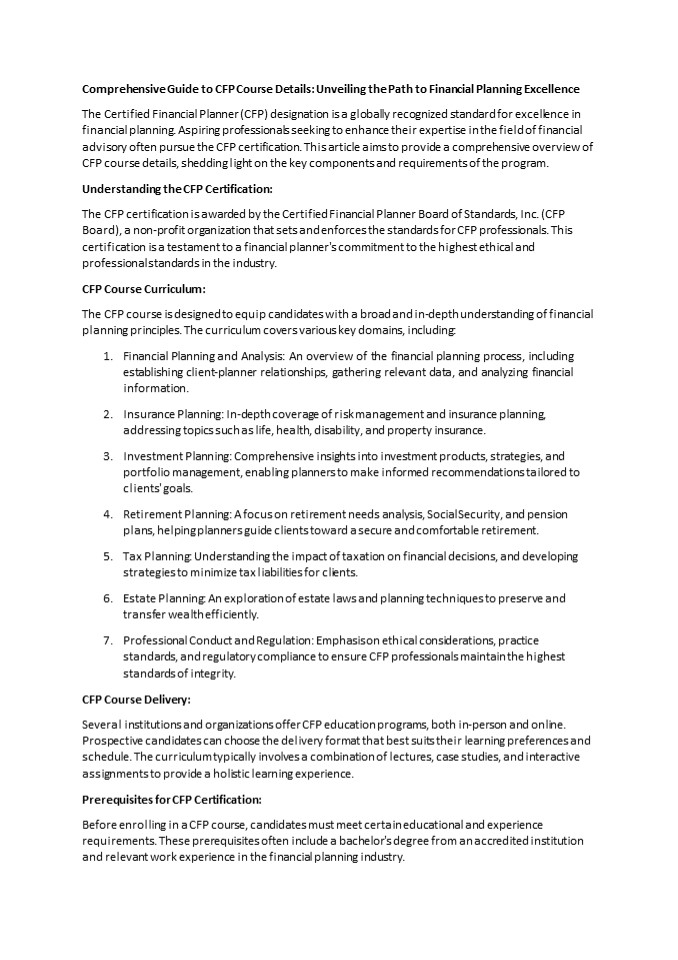Comprehensive Guide to CFP Course Details - PowerPoint PPT Presentation
Title:
Comprehensive Guide to CFP Course Details
Description:
The Certified Financial Planner (CFP) designation is a globally recognized standard for excellence in financial planning. Aspiring professionals seeking to enhance their expertise in the field of financial advisory often pursue the CFP certification. This article aims to provide a comprehensive overview of CFP course details, shedding light on the key components and requirements of the program. – PowerPoint PPT presentation
Number of Views:0
Title: Comprehensive Guide to CFP Course Details
1
- Comprehensive Guide to CFP Course Details
Unveiling the Path to Financial Planning
Excellence - The Certified Financial Planner (CFP) designation
is a globally recognized standard for excellence
in financial planning. Aspiring professionals
seeking to enhance their expertise in the field
of financial advisory often pursue the CFP
certification. This article aims to provide a
comprehensive overview of CFP course details,
shedding light on the key components and
requirements of the program. - Understanding the CFP Certification
- The CFP certification is awarded by the Certified
Financial Planner Board of Standards, Inc. (CFP
Board), a non-profit organization that sets and
enforces the standards for CFP professionals.
This certification is a testament to a financial
planner's commitment to the highest ethical and
professional standards in the industry. - CFP Course Curriculum
- The CFP course is designed to equip candidates
with a broad and in-depth understanding of
financial planning principles. The curriculum
covers various key domains, including - Financial Planning and Analysis An overview of
the financial planning process, including
establishing client-planner relationships,
gathering relevant data, and analyzing financial
information. - Insurance Planning In-depth coverage of risk
management and insurance planning, addressing
topics such as life, health, disability, and
property insurance. - Investment Planning Comprehensive insights into
investment products, strategies, and portfolio
management, enabling planners to make informed
recommendations tailored to clients' goals. - Retirement Planning A focus on retirement needs
analysis, Social Security, and pension plans,
helping planners guide clients toward a secure
and comfortable retirement. - Tax Planning Understanding the impact of
taxation on financial decisions, and developing
strategies to minimize tax liabilities for
clients. - Estate Planning An exploration of estate laws
and planning techniques to preserve and transfer
wealth efficiently. - Professional Conduct and Regulation Emphasis on
ethical considerations, practice standards, and
regulatory compliance to ensure CFP professionals
maintain the highest standards of integrity. - CFP Course Delivery
- Several institutions and organizations offer CFP
education programs, both in-person and online.
Prospective candidates can choose the delivery
format that best suits their learning preferences
and schedule. The curriculum typically involves
a combination of lectures, case studies, and
interactive assignments to provide a holistic
learning experience. - Prerequisites for CFP Certification
- Before enrolling in a CFP course, candidates must
meet certain educational and experience
requirements. These prerequisites often include a
bachelor's degree from an accredited institution
and relevant work experience in the financial
planning industry.
2
Examination Process Upon completion of the CFP
course, candidates must pass a comprehensive
examination administered by the CFP Board. The
exam assesses their ability to apply financial
planning concepts in real-world scenarios.
Successful candidates earn the right to use the
CFP designation, signifying their proficiency in
financial planning. Conclusion The pursuit of
CFP certification is a significant step for
individuals aspiring to excel in the field of
financial planning. This article has provided a
detailed overview of CFP course details,
highlighting the comprehensive curriculum,
delivery methods, prerequisites, and the
examination process. As financial planning
continues to gain importance in a complex
economic landscape, the CFP certification stands
as a symbol of expertise and commitment to the
highest standards of professionalism.































